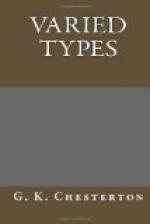Instances of this would not be difficult to find. But the tests of poetry are those instances in which this outrageous scientific phraseology becomes natural and unconscious. Tennyson wrote one of his own exquisite lyrics describing the exultation of a lover on the evening before his bridal day. This would be an occasion, if ever there was one, for falling back on those ancient and assured falsehoods of the domed heaven and the flat earth in which generations of poets have made us feel at home. We can imagine the poet in such a lyric saluting the setting sun and prophesying the sun’s resurrection. There is something extraordinarily typical of Tennyson’s scientific faith in the fact that this, one of the most sentimental and elemental of his poems, opens with the two lines:
“Move eastward, happy earth, and
leave
Yon orange sunset waning slow.”
Rivers had often been commanded to flow by poets, and flowers to blossom in their season, and both were doubtless grateful for the permission. But the terrestrial globe of science has only twice, so far as we know, been encouraged in poetry to continue its course, one instance being that of this poem, and the other the incomparable “Address to the Terrestrial Globe” in the “Bab Ballads.”
There was, again, another poetic element entirely peculiar to Tennyson, which his critics have, in many cases, ridiculously confused with a fault. This was the fact that Tennyson stood alone among modern poets in the attempt to give a poetic character to the conception of Liberal Conservatism, of splendid compromise. The carping critics who have abused Tennyson for this do not see that it was far more daring and original for a poet to defend conventionality than to defend a cart-load of revolutions. His really sound and essential conception of Liberty,
“Turning to scorn with lips divine
The falsehood of extremes,”
is as good a definition of Liberalism as has been uttered in poetry in the Liberal century. Moderation is not a compromise; moderation is a passion; the passion of great judges. That Tennyson felt that lyrical enthusiasm could be devoted to established customs, to indefensible and ineradicable national constitutions, to the dignity of time and the empire of unutterable common sense, all this did not make him a tamer poet, but an infinitely more original one. Any poetaster can describe a thunderstorm; it requires a poet to describe the ancient and quiet sky.
I cannot, indeed, fall in with Mr. Morton Luce in his somewhat frigid and patrician theory of poetry. “Dialect,” he says, “mostly falls below the dignity of art.” I cannot feel myself that art has any dignity higher than the indwelling and divine dignity of human nature. Great poets like Burns were far more undignified when they clothed their thoughts in what Mr. Morton Luce calls “the seemly raiment of cultured speech” than when they clothed them in the headlong and flexible patois in which they thought and prayed and quarrelled and made love. If Tennyson failed (which I do not admit) in such poems as “The Northern Farmer,” it was not because he used too much of the spirit of the dialect, but because he used too little.




